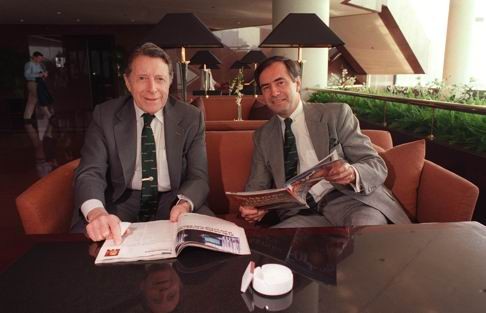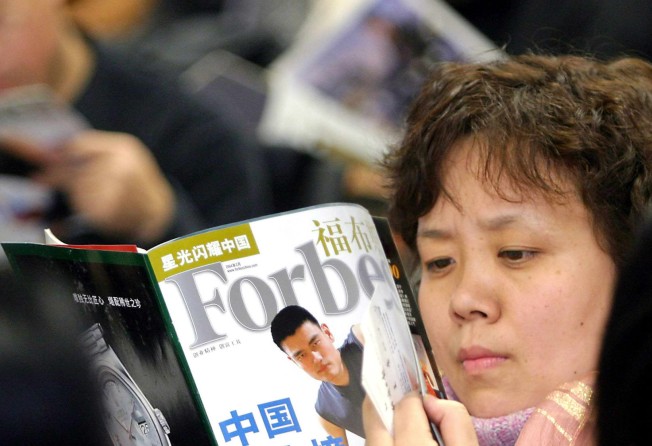
Hong Kong-based bidder in soured Forbes deal hits back at original owners

The Hong Kong-based investment group behind last year’s purchase of Forbes media empire has asked a US court to throw out a lawsuit against them saying the allegations are without merit.
Integrated Whale Media Investment (IWM), based at 9 Queens Road, Central, was accused in late October of failing to meet the terms of the deal, as well as withholding income streams owed to the founding Forbes family.
The original claim was filed in the Delaware courts by a company belonging to the Forbes family called Highlander Management.
IWM has now fired back at the original owners of the eponymous magazine group saying the allegations made are “materially false” and “irrelevant” and should be dismissed, in part, because of a near-identical case filed by Highlander that is already under way in the British Virgin Islands court.
The Delaware lawsuit “is completely without merit” a IWM spokesperson told the South China Morning Post, saying that the dispute “is solely between shareholders at the holding company level...(and) does not and will not have any impact on Forbes Media’s day-to-day operations and future growth”.
Registered in the British Virgin Islands, IWM includes among its shareholders Wayne Hsieh, founder of Taiwanese electronics company Asus, and Hong Kong businessman Yam Tak-cheung.
According to details contained in this week’s filing, IWM originally wanted to buy an 80 per cent stake for US$350 million in cash but agreed to take over an extra 15 per cent for US$65.62 million after a last-minute request from the vendor.
The second stake would be paid for in three instalments using promissory notes with durations between 18 months and 7 years. The deal would leave the Forbes family with a roughly 5 per cent stake with family patriarch Stephen Forbes staying on as chairman and editor-in-chief after the sale.
The promissory note payment structure was “to accommodate the Forbes family’s expressed tax planning needs” the filing said.
IWM admits missing a US$46,459 interest payment on the promissory notes but argues the Forbes family “unreasonably” demanded full payment on the entire amount under the terms of the lending agreement, even though the interest payment was soon settled.
“The recent filing is a typical motion to dismiss. These are rarely granted and are interposed to delay the resolution of the case. This is more of the same delay tactics from IWM, and the motion does not challenge the merits of the claims but simply seeks delay on procedural grounds. Indeed they admit to defaulting on the interest payments and admit that they cannot identify a quantifiable indemnity claim as they are required to do,” a source close to the Forbes family told the South China Morning Post.
“When first introduced to Forbes, IWM offered to lend money on terms that were rejected out of hand, as they were commercially unreasonable and sought to strip control of the company on the basis of an inadequate loan. This unsolicited proposal was summarily rejected. Later, when the sale process was commenced, IWM offered to buy the company as noted in complaint. As a result of the past offer, the sellers included strict protections in the deal including the right to accelerate the notes.”
In their original filing the Forbes family argued: “From the outset of the supposed partnership, Integrated Whale and its principals have steadfastly refused to pay what they clearly owe, and instead have made a series of baseless – and often patently false – excuses.”

IWM also hit back at accusations they had refused to hand over US$35 million held in escrow and that they had embarked on “a retaliatory, multifront campaign of oppression through the abuse of the corporate machinery.”
The escrow money was supposed to be paid to the Forbes family one year after the deal completed but in their defence IWM accuse the Forbes family of failing to disclose before the transaction took place that they had terminated the media’s group Ukrainian licensee, which prompted an arbitration suit from the license holder.
“(Forbes family controlled Forbes Media Holdings) represented in the Purchase Agreement that this license agreement (and all other material contracts) remained in full force and effect and was not in default,” IWM court filing said.
IWM argues it needs the escrow money to fund the litigation and is demanding the Forbes family take over the costs of the litigation.
The former licensee is suing Forbes Media for “tens of millions in damages”, the filing said.